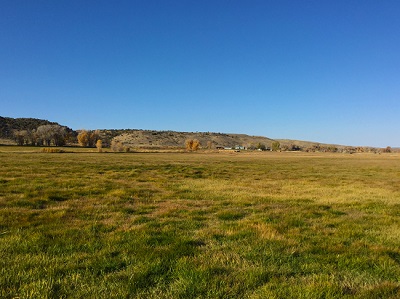
Purple Sage Ranch is located in Carbon County.
Baggs, Wyo.—The Wyoming Stock Growers Land Trust (WSGLT) has conserved 2,257 acres of Purple Sage Ranch located in Carbon County near the Wyoming/Colorado border.
The conservation easement, which was made possible through funding from the Wyoming Wildlife and Natural Resources Trust (WWNRT) and the National Fish and Wildlife Foundation (NFWF), is a shining example of conservation offsetting environmental impacts from energy development. Funding from NFWF originated from a community service payment received pursuant to a 2014 criminal environmental case prosecuted by the United States Attorney’s Office for the District of Wyoming involving a wind energy company’s violations of the Migratory Bird Treaty Act. The conservation easement will prevent future subdivision and development of the ranch; protect nesting, feeding, and migration habitat for bald and golden eagles; and protect other important wildlife habitats.
“The National Fish and Wildlife Foundation supported the conservation of Purple Sage Ranch to protect habitat for golden and bald eagles in Wyoming,” said Chris West, director of NFWF’s Rocky Mountain Regional Office. “This project shows that protecting wildlife and securing future ranching go hand in hand. The wildlife habitat exists on the ranch because of the outstanding stewardship of the landowners.”
Purple Sage Ranch offers a diversity of ecosystems – from sagebrush range lands to woody wetlands. These ecosystems, and the un-fragmented ranch land, provide critical habitat for a wide array of wildlife including antelope, elk, and mule deer. Bob Budd, Executive Director of WWNRT commented on the conservation of the ranch saying, “Congratulations and thanks to the Davis family for maintaining the agricultural and natural resource legacy of the land.
The Davis family, who own and operate the ranch for beef cattle and grass hay production, strive to manage their ranch in a way that encourages healthy habitat for fish and wildlife. In addition to the conservation easement, the family has worked on several stream restoration projects meant to improve habitat within the Little Snake River and its riparian corridor. Bob Davis, spoke for the family saying, “We would like to thank the Wyoming Stock Growers Land Trust for their help with the conservation easement. We have a traditional family ranch with 3 generations working and living on the ranch. We all feel the wildlife is a large part of the beauty of our ranch, so we wanted to maintain essential habitat for the Bald Eagle, Golden Eagle, Sage Gross, Elk and Deer on our property and continue running the property as a working cattle ranch.”
This project closing marks the WSGLT conserving over 34,000 acres of working landscapes in Carbon County and 258,372 acres across the state. Conserving these landscapes helps to support Wyoming’s farmers and ranchers, rural communities, wildlife habitats, waterways, and the legacy of Wyoming. “The Purple Sage Ranch is a wonderful example of a WSGLT conservation easement project,” commented Eric Schacht, WSGLT Stewardship Director. “It is a productive working ranch that supports a multi-generational family, and provides incredible wildlife habitat.”

Purple Sage Ranch is a multi-generational ranch located in Carbon County.
About the Wyoming Stock Growers Land Trust
The Wyoming Stock Growers Land Trust is dedicated to conservation through ranching. Based in Cheyenne, the non-profit organization serves the entire state and is Wyoming’s only agricultural land trust. Through partnerships with ranch families, the Wyoming Stock Growers Land Trust holds and stewards conservation easements on more than 258,000 acres of land on ranches and farms throughout Wyoming. Founded in 2000 by the 140-year-old Wyoming Stock Growers Association, it is one of the largest among the 1,659 regional land trusts in the United States. For more information, visit wsglt.org.
About the National Fish and Wildlife Foundation
Chartered by Congress in 1984, the National Fish and Wildlife Foundation (NFWF) protects and restores the nation’s fish, wildlife, plants and habitats. Working with federal, corporate and individual partners, NFWF has funded more than 4,500 organizations and generated a conservation impact of more than $4.8 billion. Learn more at www.nfwf.org.

